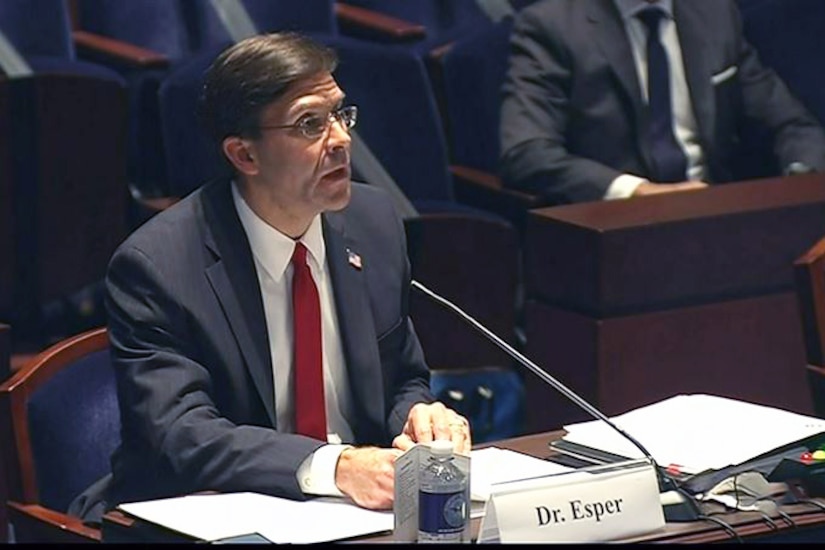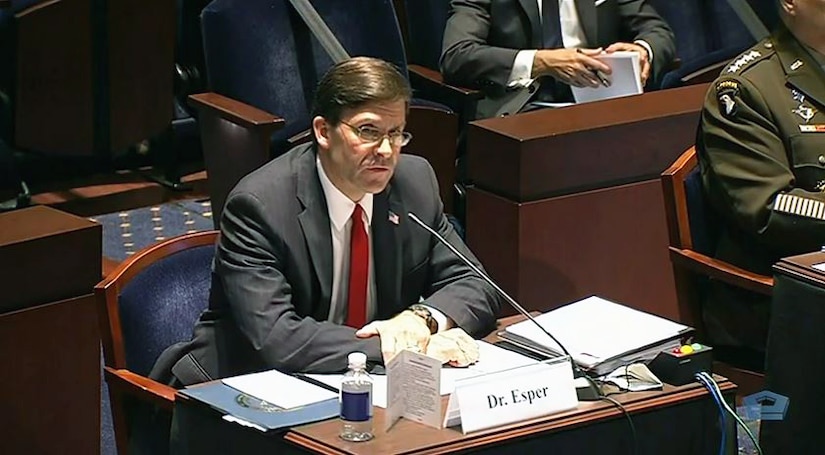Defense Secretary Dr. Mark T. Esper told the House Armed Services Committee today that National Guardsmen protected Americans' right to peaceably assemble and petition the government in the wake of some violent protests following the death of George Floyd. A Minneapolis police officer has subsequently been charged with his murder.
Esper emphasized that while active duty forces were on alert to help civilian authorities, no active duty forces were used.
 |
In prepared remarks, the secretary praised National Guard personnel for their actions. The Guard has been subjected to unprecedented use in the coronavirus pandemic. More than 60,000 guardsmen, active duty personnel and reservists have supported state and federal civilian agencies in the battle against COVID-19, Esper said. Service members undoubtedly saved lives as the United States faced the pandemic and Esper said he is ''incredibly proud of their dedication and service.''
The secretary called Floyd's death in May, ''a tragedy we have seen repeated too often in our nation. His death evoked public outrage and illustrated a painful truth that racial injustice continues to afflict our country to this day.''
Americans across the country took to the streets to ''exercise their First Amendment rights by voicing their anguish, frustration and longing for change,'' he said. ''Although many of these protests were peaceful and law-abiding, it is clear that some individuals exploited the situation to sow chaos and commit acts of violence, destruction and theft.''
There were clashes with police in many cities including Minneapolis, Atlanta, New York, Louisville and Washington. The violence included buildings and vehicles that were set on fire and vandalized, the looting of stores, and injuries to law enforcement personnel and innocent bystanders.
The respective governors called upon their National Guards to restore order and safeguard communities, businesses, monuments and places of worship. ''In doing so, the National Guard once again demonstrated its commitment to upholding the rule of law and protecting life and liberty, so that the violent actions of a few do not undermine the rights and freedoms of law-abiding citizens, or jeopardize the livelihood of hard working Americans,'' Esper said.
The secretary emphasized that all members of the armed forces swear an oath to support and defend the Constitution, ''and we commit to doing so in our longstanding tradition of remaining apolitical.'' The secretary himself served in the Army National Guard.
Freedom of speech and assembly are guaranteed by the Constitution, ''and in cities across America, National Guard personnel were devoted to protecting these sacred rights, despite the risk to their own safety and personal well-being,'' Esper said.
Esper stressed that he firmly believes the National Guard is best suited to provide domestic support to civil authorities, in support of local law enforcement.

''Using active duty forces in a direct civilian law enforcement role should remain a last resort, and [be] exercised only in the most urgent and dire of situations,'' he said. ''I want to make very clear that no active duty military units engaged protesters or otherwise took a direct part in civilian law enforcement or federal protection missions in the District of Columbia or anywhere else in the country.''
At the height of the civil unrest, more than 43,000 Army and Air National Guard personnel in 33 states and the District of Columbia were called upon to assist federal, state and local law enforcement agencies in restoring and maintaining order, protecting communities, and defending the rights of all Americans to protest safely and peacefully, he said.
''At the peak of response efforts in the District of Columbia, more than 5,100 National Guard personnel from the District of Columbia National Guard and 11 States – Florida, Idaho, Indiana, Maryland, Mississippi, Missouri, New Jersey, Ohio, South Carolina, Tennessee and Utah – were authorized by their respective governors to provide support,'' he said. ''The D.C. National Guard supported the U.S. Park Police, the U.S. Marshals Service and the District of Columbia Metropolitan Police Department.''
The guardsmen's authorized duties included protection of federal property; point security, crowd management, and access control; acting as a quick response force; medical support; and transportation of personnel and supplies. ''The out-of-state National Guard personnel protected federal functions, persons and property in collaboration with federal law enforcement agencies,'' he said.
At the height of the protests, it became obvious that there were not enough guardsmen in Washington. Neighboring states were contacted, but it was unclear whether the personnel would arrive. ''I then placed approximately 1,700 active-duty military personnel on alert in Maryland and Virginia in the event that out-of-state National Guard personnel could not arrive in time,'' Esper said.
These included local active duty forces and military police units based at Fort Bragg, North Carolina; Fort Drum, New York; and Fort Riley, Kansas.
''I subsequently ordered them to be pre-positioned at Joint Base Andrews, Maryland; Fort Belvoir, Virginia; and Joint Base Myer-Henderson Hall, Virginia, where they remained on alert,'' Esper said. ''These active duty personnel remained outside of the District of Columbia.''
The active duty forces were not needed as additional guardsmen arrived and Esper subsequently ordered the active duty troops to return to their garrisons.








No comments:
Post a Comment